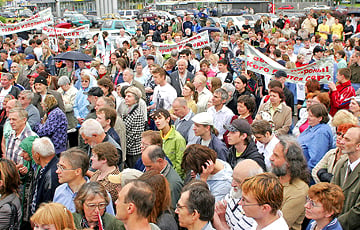Lukashenka Steps Over the Red Line
99- 25.04.2016, 9:05
- 21,996

Experts of the IMF are concerned about financial state of Belarus.
Mission of the International Monetary Fund (IMF) has accomplished the estimation of the financial sector of Belarus. Experts are concerned about the debt level of companies and recommend to reform problematic enterprises, Nezavisimaya Gazeta writes.
"The financial sector characterized by a dominant position of state institutions faces domestic structural problems, dollarization and external negative factors. The regulation of problem assets, which should be closely connected with corporate restructuring, is of great importance to preserve financial stability," the IMF's press-release on mission's results says.
The joint mission of the IMF and the World Bank (WB) presented in April 5-21 in Minsk. Its objective was to assess the financial state of Belarus. "The mission has assessed both weak and strong sides of the financial sector, as well as conducted the analysis of basics in supervisory activities, mechanisms for force majeures and promotion measures in the financial sector," the press-release informs.
The IMF's opinion on the condition of the Belarusian economy is essential, because Minsk has asked for other financial program equaled to $3 billion. The negotiations have still resulted into nothing. Experts of the IMF insist on reforms and demand guarantees of their implementation, the last program was failed, because of Lukashenka's order not to carry out reforms. The other mission arrives in June.
While the address to the "Parliament" and the people last week, Aliaksandr Lukashenka authorized the government to cut the red tape on the way to contract execution with international financial organizations and use their "great investment potential." The cooperation with the IMF, according to Lukashenka, calls for special attention. "The program with the IMF is not a plaster for all sores, but an indicator for openness of our economy. We should promote our interests, while negotiations with the IMF and call for understanding," the ruler said.
According to local observers, such position, on the one hand, shows an acute need of money. On the other hand, they doubt that the Lukashenka's decision is a sincere and deliberate one. "Lukashenka voiced ideas of his counselors, who offer to attract credit resources of Western financial institutions," Belarusian economist Anton Boltochko says.
Moreover, the current economic sector gives no cues for upcoming changes. Experts says that the dictator's economic proposals cannot be implemented under current Belarusian realities.
"Other Lukashenka's address to the "Parliament" and the people was tagged by journalists as the shortest among 20 previous ones. It is true. Besides, it seemed to be pale, unenthusiastic and with lack of fervour of the orator. One has the impression that the orator himself does not believe in his words and cannot hide it. Earlier, he looked like he sincerely believed in his projects and mantras of populist character", Myachyslaw Hryb wrote on Facebook.
Lukashenka said right things: we need to increase the labor productivity, create the economy of the day after tomorrow, based on nano- and biotechnology, develop small business, attract direct foreign investments, sell more abroad, have less imported goods, make production of good quality, pay debts in time, comply with the budget. At the same time it looks like the Belarusian dictator has forgotten that the country has been facing the economic recession, people's income is getting low, the production is not sold, growing debts spell a default. Overdue debts in the core sectors - agriculture, construction, industry - made up 31.6%, 20.7% and 19.9% relatively, and, according to experts, it is impossible to pay them.
The main government's mistake is, independent experts say, that it keeps its eye closed on negative tendencies. Instead of closing down loss-making industry and reteach people, it preserves the problem and even deteriorates it.
"The relative share of debts against the GDP has exceeded 70%. It is more than the red line. The dead point, specified by our government, was 50%. Not it equals to 70%. This is the edge of the default," Stanislau Bahdankevich, former head of the National Bank of Belarus, said.









